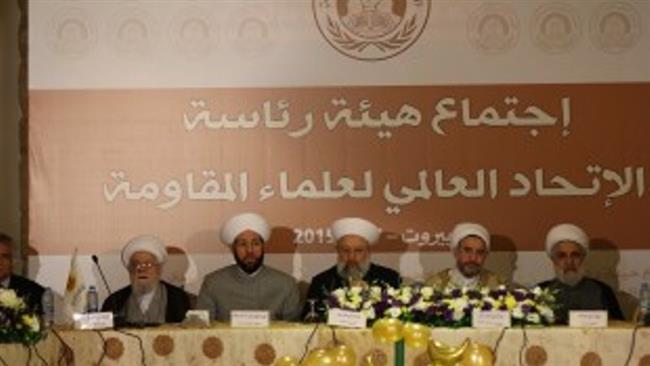
RNA - Participants, both Sunnis and Shias, at the International Union of Resistance conference in Beirut on Wednesday discussed ways to promote unity and solidarity in the Muslim world and focus on the problems facing the Islamic world. They highlighted the cultural and religious commonalities among Muslim countries and stressed the need for them to set aside their differences.
The organizer of the event, the International Union of Resistance, was formed in the Lebanese capital last year to create a unified front in the face of the Israeli threat in the strategically important region of the Middle East.
In their speeches and messages, the Muslim academics said that confronting the Tel Aviv regime has always been the top priority of Islamic resistance movements.
The Muslim intellectuals at the conference also expressed their strong will and determination to counter the Israeli threat despite the risks involved.
The scholars pointed out that Israel is on the verge of collapse due to its brutal policies and vowed to continue the resistance against the entity until its fall.
The academics described Israel as a root cause of economic, political and cultural problems facing Muslim nations in recent decades.
On January 8, 2015, the Palestinian resistance movement Hamas called on all Islamic states to stand by the Palestinian nation in its struggles against Israeli atrocities.
Speaking on the sidelines of the 28th International Islamic Unity Conference in Tehran, Khaled al-Qaddumi, the representative of Hamas in Iran, described resistance as the only way for Palestinians to end the Israeli regime’s occupation of their lands, urging the Islamic states to throw their weight behind the Palestinian nation.
Palestinians are seeking to create an independent state on the territories of the West Bank, East al-Quds (Jerusalem), and the besieged Gaza Strip and are demanding that Israel withdraw from the occupied Palestinian territories.
Israel, however, has refused to return to the 1967 borders and is unwilling to discuss the issue of al-Quds.
The developments come as Israel has also launched three wars on Palestinians in the besieged Gaza Strip since 2008.
During the latest war against the Gaza Strip in summer 2014, Israel used advanced US-made arms and warplanes to kill over 2,000 Palestinians. According to the UN, over 80 percent of the Palestinian fatalities were civilians, including more than 500 children.
Israel has also repeatedly attacked Lebanon over the past decades. About 1,200 people, mostly civilians, were killed in the Israeli regime’s war on Lebanon in 2006.
Secretary General of Lebanon's Hezbollah resistance movement, Seyyed Hassan Nasrallah, has frequently said Hezbollah had both the capability and courage to defend Lebanon and that the movement's missiles were ready to strike certain targets inside Israel in self-defense if Tel Aviv launches an attack on Lebanon.
The Israeli regime has also carried out several airstrikes inside Syria since the unrest began there in 2011.
R111/108/C/